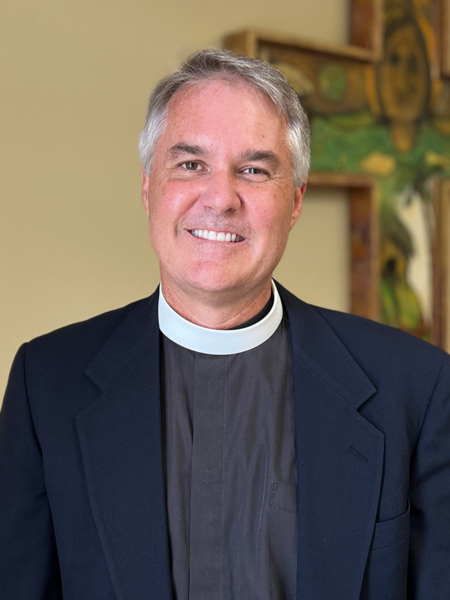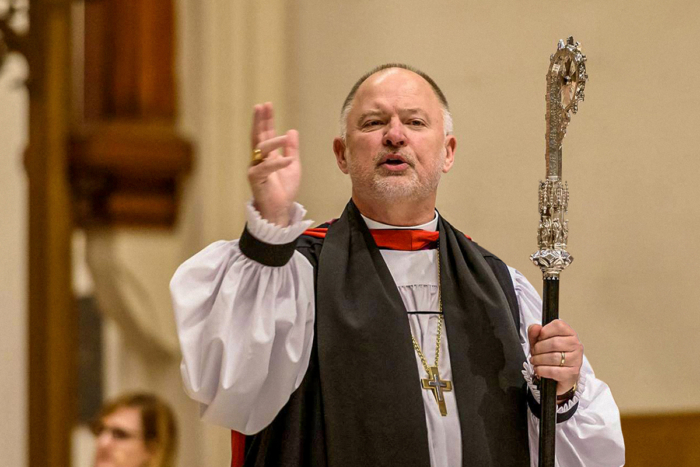Diocese of Florida issues formal request for churchwide consent to disputed bishop electionPosted Mar 22, 2023 |
|
[Episcopal News Service] The Diocese of Florida Standing Committee on March 22 issued its official closing argument affirming the validity its bishop coadjutor election as part of a package of materials that are being sent to bishops and standing committees across The Episcopal Church seeking their consent to the election result.
Invoking the church’s acceptance in 2003 of New Hampshire Bishop Gene Robinson as the first openly gay Episcopal bishop, the Florida standing committee appealed to today’s church leaders “to extend the same generosity by offering your consent to the will of the majority of the Diocese of Florida.”
Granting such consents typically is routine, but the November election of the Rev. Charlie Holt has faced objections from within the diocese and beyond, over concerns about election procedures, Holt’s fitness to serve and evidence of anti-LGBTQ+ discrimination against clergy in the Diocese of Florida that may have skewed the result.

The Rev. Charlie Holt was declared the winner of the November 2022 bishop coadjutor election in the Diocese of Florida.
The standing committee, in defending the diocese’s choice of Holt for bishop, called him “a peacemaker, a collaborator, a reconciler and a man who has demonstrated a willingness to listen to and learn from those with different views and backgrounds.”
The Jacksonville-based diocese is known as one of the most conservative in the church, and several gay and lesbian priests have said the diocese under Bishop John Howard violated the church’s long-standing anti-discrimination canons by blocking paths to ordination and canonical residency for those who weren’t willing to remain celibate. Because only canonically resident clergy could vote, the discrimination allegations cast doubt on the integrity of the November election, according to an investigation by the churchwide Court of Review. The court also found fault in how the diocese assigned eligibility to lay delegates.
The Court of Review’s conclusions are not binding, but they are included in the packet of information the diocese sent to bishops and standing committees seeking their consent to Holt’s election. The packet also was posted to the diocese’s website. It includes the standing committee’s 12-page response to the Court of Review report and a letter from Holt to churchwide leaders outlining how he would lead if his election is affirmed, as well as an article offering historical and personal perspectives on Howard’s 19 years of leadership of the diocese.
Bishops and standing committees have 120 days to give or deny consent. Failure to receive a majority in either group would negate Holt’s election.
In its response, the standing committee stood by the November election as “procedurally fair and valid” and denied allegations against Holt and the process, which it said were fueled by “agitators outside our diocese.” If people were excluded from the voting pool, it was because the ineligible clergy member didn’t qualify for canonical residence or hadn’t requested it, “not because of their sexual orientation, their theology of marriage or their views on human sexuality,” the response said.
The standing committee also argued that the Court of Review did not give diocesan leaders an opportunity to respond to discrimination allegations “based largely on anonymous and undated reports.” Episcopal News Service was able to identify and contact several of the individuals who made the core allegations documented in the Court of Review’s report, for an ENS article last month about the diocese’s treatment of openly gay and lesbian clergy.
The standing committee continued that it was “particularly alarmed” at the Court of Review’s implication that any bishop election would be tainted by the diocese’s past practice for granting clergy voice and vote. Such a standard, not based on the election process itself, would be “disastrous for our ministry and mission and would greatly deepen the divisions that are already being sown among us.” It further argued that the allegations against Howard were irrelevant to the question of the election’s validity, and the Court of Review “exceeded its canonical mandate by investigating matters unrelated to the electoral process.”
“With humility and hope for our future, we ask you to pray and to offer consent to the election of the Rev. Charlie Holt,” the standing committee wrote. “We have chosen him to lead us and to help us move forward into God’s future.”
Howard, the outgoing bishop, called in February 2021 for the election of bishop coadjutor to succeed him because of his plan to retire by the end of this year. He will reach The Episcopal Church’s mandatory retirement age of 72 in September.

Bishop John Howard has led the Jacksonville-based Diocese of Florida since 2004. Photo: Diocese of Florida
Florida’s request for consents comes a day after TransEpiscopal, a group that advocates for more inclusive church policies towards transgender people, released a letter to churchwide leaders asking them to withhold consent for Holt’s election.
“The issue is not whether a diocese can elect the bishop who best fits their charism … but whether the process of that election fundamentally extends a pattern and practice of discrimination that we have agreed, in our polity, not to uphold,” TransEpiscopal said. “While the specifics of this situation are distinct to the Diocese of Florida, the issues and power dynamics at play here matter for and reverberate across the whole church.”
Other Episcopal groups, including the Deputies of Color and a group of LGBTQ+ leaders, have issued their own calls for bishops and standing committees to deny consent.
The November election was the second in which Holt was declared the winner. In May 2022, Holt won the first election in the third round of balloting, but some delegates objected to how that election was conducted, with some clergy allowed to attend online. In August, the Court of Review sided with the objectors, concluding that “a clergy quorum was not reached” in accordance with the diocese’s official election process, and “the action of the diocese in changing its manner of voting two days prior to the election was fundamentally unfair to the delegates of the convention and the candidates.”
In addition to the objections to the election process, some Episcopalians have voiced concerns about Holt, citing his conservative views on same-sex marriage and statements that they view as intolerant or insulting to LGBTQ+ people and Black people. Holt responded to those concerns in a June 2022 video message to members of the diocese and The Episcopal Church.
Holt previously served as associate rector of teaching and formation at the Church of St. John the Divine in Houston, Texas. The Diocese of Florida hired him as a diocesan staff member while the first election was under review. In response to the Court of Review’s conclusions, Holt withdrew his acceptance of the first election, and the Standing Committee called for the second election, promising to address concerns about the process.
In November, Holt again was on the ballot alongside the Rev. Miguel Rosada and the Rev. Beth Tjoflat. On the first ballot, Holt received 56 clergy votes, the minimum needed for election, and received 79 lay votes (67 were required), so no subsequent round of balloting was necessary.
In his March 22 letter to bishops and standing committees that was included with the diocese’s request for consents, Holt said he is “determined to be the best bishop and pastor to ALL the people of the diocese. I will work to create a big tent community filled with the loving spirit of belonging in Jesus Christ.”
Holt alluded to past and existing divisions in the diocese over same-sex marriage, and he pledged to spend his first years as bishop engaged in “careful mediated listening across the diocese with all members – especially members of the Union of Black Episcopalians, people and clergy of color serving in the diocese, and members of the LGBTQ community who have felt excluded from previous conversations.”
He added that he and diocesan leaders are developing a suitable listening process in collaboration with Bishop Mary Gray-Reeves, the retired bishop of the Diocese of El Camino Real in California and vice-president of the House of Bishops. He also reiterated his previously stated commitment to ensure marriage liturgies are made available to same-sex couples in the diocese.
“The Diocese of Florida has great clergy and laity,” Holt said, “and together I believe we can and will heal our relationships with one another in the name of Christ and for the sake of church unity, our Christian witness and God’s mission.”
– David Paulsen is a senior reporter and editor for Episcopal News Service. He can be reached at dpaulsen@episcopalchurch.org.

Social Menu